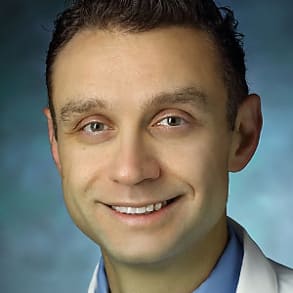Ahmad Marashly, medical director of the pediatric epilepsy surgery program, discusses the role of epilepsy surgery in managing patients with drug-resistant epilepsy. About 70% of patients with epilepsy will respond to one or two antiseizure medications and maintain long-term seizure freedom. Patients with drug-resistant focal epilepsy should consider epilepsy surgery. Johns Hopkins has one of the few epilepsy centers in the country that can evaluate and perform surgery for these patients. Please visit hopkinsmedicine.org/epilepsy to learn more about the Johns Hopkins Epilepsy Center.
Hello, my name is Aman M Ashley. I'm one of the pediatric apologists and the medical director of the pediatric eps surgery program at Johns Hopkins. Today, I would like to talk to you about the role of epilepsy surgery in managing patients with drug resistant eps. About 70% of patients with epilepsy would respond to one or two anti seizure medications and maintain long term seizure freedom that leaves about one third of patients with seizures unable to reach seizure freedom using medical therapy of those. About one half of them have what we can call drug resistant focal eps in which seizures arise from one and sometimes more than one specific region in the brain that is when app of surgery should and must be considered. There is a big evidence including clinical trials that examined the role and the efficacy of A plus surgery. And about 60 to 70% of patients who undergo epilepsy surgery following a specific and a well thought plan would achieve seizure freedom in comparison to only 4 to 7% of patients who continue medical therapy. To that end. It is extremely important to identify those patients as soon as possible and refer them to a specialized apology surgery center. In the past, it was classically thought of app of surgery to be a last resort. But we now know that the impact of see your freedom on the patient's cognition, quality of life and other aspects is so profound that app of surgery must be thought of as a first resort immediately after drug resistance is established to that end, the role of the surgery team, which includes an epileptologist, a neurosurgeon, a neuropsychologist, neurologist, and many other specialists is to try to map out the part of the brain that is producing the seizures. In order to assess the feasibility of epilepsy surgery. App of surgery is not one procedure rather, it comprises many different procedures, including the classical or receptive or disconnective surgery all the way to the newly emerging neuromodulatory therapies including responsive neurostimulator, uh and deep brain stimulation. Johns Hopkins is one of the few centers in the country that have the capabilities of evaluating and performing surgery in virtually any patient that could benefit from it. With that. I invite you to visit the Epo Center website to learn more. And thank you.



